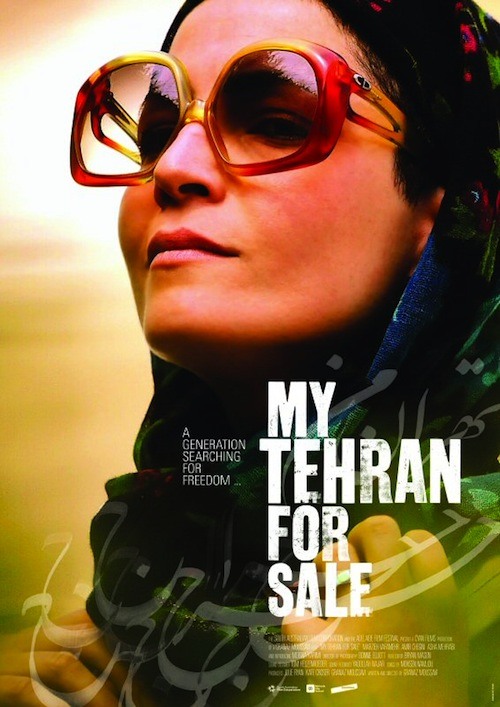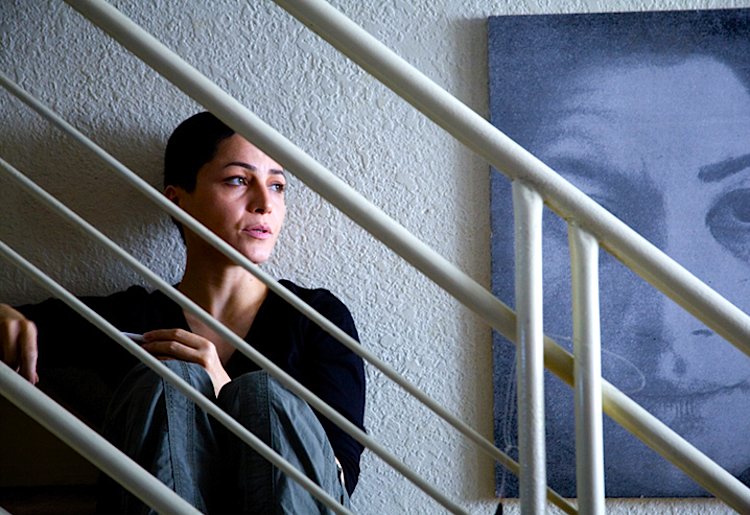 By Joe Bendel. Recently, in response to the categorical rejection of Iranian filmmaker Jafar Panahi’s appeal and the truly barbaric sentence of one year in prison and ninety lashes handed down to actress Marzieh Vafamehr, many prominent Iranian artists (including the great Shohreh Aghdashloo) have called on the world to “boycott official Iranian film and television organizations and sanction its members.” While their outrage is appropriate, the work that caused Vafamehr’s plight should not be thrown out with the bathwater. An important film even before the arrest of its lead actress, the Iranian born Australian-based filmmaker Granaz Moussavi’s My Tehran for Sale (trailer here) recently screened during the inaugural Dialogue of Cultures Film Festival in New York.
By Joe Bendel. Recently, in response to the categorical rejection of Iranian filmmaker Jafar Panahi’s appeal and the truly barbaric sentence of one year in prison and ninety lashes handed down to actress Marzieh Vafamehr, many prominent Iranian artists (including the great Shohreh Aghdashloo) have called on the world to “boycott official Iranian film and television organizations and sanction its members.” While their outrage is appropriate, the work that caused Vafamehr’s plight should not be thrown out with the bathwater. An important film even before the arrest of its lead actress, the Iranian born Australian-based filmmaker Granaz Moussavi’s My Tehran for Sale (trailer here) recently screened during the inaugural Dialogue of Cultures Film Festival in New York.
In what will become an ever more self-referential turn, Vafamehr plays Marzieh, an avant-garde actress seeking to expatriate because her plays have been banned by the censors. She is well educated, middle class, and ideologically moderate, none of which are much of an advantage in contemporary Iranian society. Navigating the Kafkaesque immigration process for years, Marzieh is hoping to soon liquidate all her possessions to finance her move. Of course, complications arise.
Initially, Marzieh has a bit of good fortune. Attending an underground rave in the countryside with her friend Sadaf, Marzieh happened to be in the stables with Saman, the recently repatriated son of immigrants looking to make his fortune in Tehran. Given the unambiguous nature of their encounter, this scene probably did not help Marzieh’s case. However, the real scandal is the conduct of the morality police, terrorizing women like Sadaf for their unadorned heads.
Quickly Marzieh and Saman become something of an item. Despite his myriad of faults, Marzieh enjoys a somewhat pleasant interlude. Still, grim realities are ever-present in the margins of Sale, represented by a woman committing suicide rather face the disgrace of pregnancy out of wedlock, the whispered news of yet another colleague’s arrest, or simply the general sense of unease surrounding her life.
In truth, Marzieh is not always fun to be around. Flesh and blood humans are messy that way. In a sense, Sale is like Agnieszka Holland’s A Lonely Woman. In both films, the toxic repression of their societies metastasizes inside the respective protagonists, at least spiritually and in Marzieh’s case, physically as well.
Based on a limited sampling of Iranian films to screen on the festival circuit in recent years, Sale is a tad ambitious in the amount of sensitive subject matter it forthrightly addresses, including artistic censorship, drug use, romantic relationships, secular music – and tragically, AIDS. We even hear the lashes administered on others, which will also be in Vafamehr’s future unless sufficient pressure is brought upon the Islamist authorities to reverse course. As an artist, Moussavi should explore any area her characters take her to. In practical terms though, the extent that she does so is fairly bold.

Shot on location in Iran (with all the proper permits according to Moussavi), Sale was intentionally scrupulous about observing Islamic decorum throughout the production, aside perhaps from a few scenes of women without headscarves. Of course, one of the advantages of a police state is that the authorities do not have to justify a seemingly arbitrary decision. Frankly though, it seems clear Vafamehr is being punished for the manner in which Sale holds a mirror up to Iranian society, presenting a vision the government does not like to see.
While her sentence could be dubbed the harshest review ever, Vafamehr is forcefully compelling as her namesake. Smart but flawed, she conveys Marzieh’s mounting frustration with visceral power that literally bursts out of her in one unforgettable scene. In a less showy role, Asha Mehrabi is also very engaging as the well-intentioned but essentially helpless Sadaf.
This is a film that has been caught up in macro dynamics beyond its possible control. Sale is an intense film featuring a bravely revealing performance from its lead. It ought to be thought of as an Iranian cousin of Cassavetes films like Opening Night and A Woman Under the Influence, but in the current climate, it stands as a pointed rebuke to the hypocrisy amok in Iran today. The fact that it deliberately stops short of endorsing anyone or anything outside the current norms clearly matters little to the mullahs in power. Recommended as a film in its own right and as symbol of artistic freedom under fire in Iran, Sale ought to be widely screened by film institutions in coming months as a way to focus attention on Vafamehr’s shocking plight.
Posted on October 24th, 2011 at 10:56am.